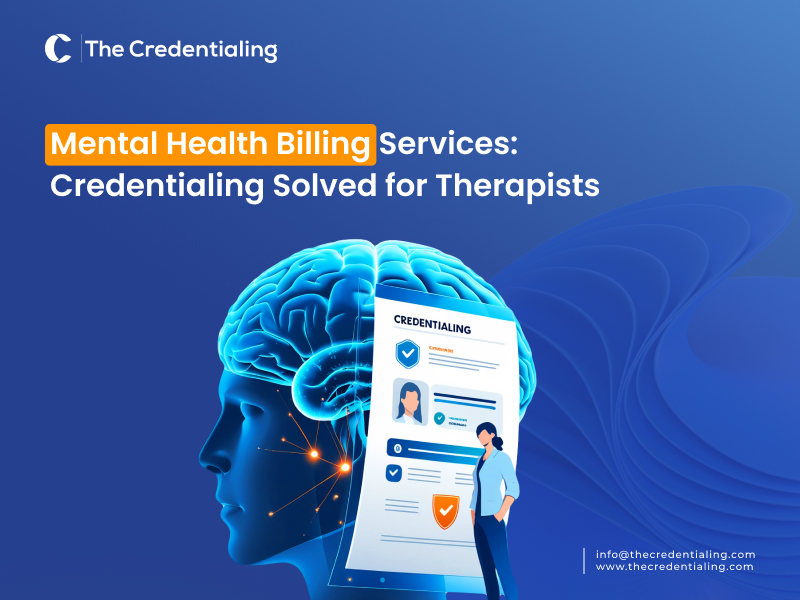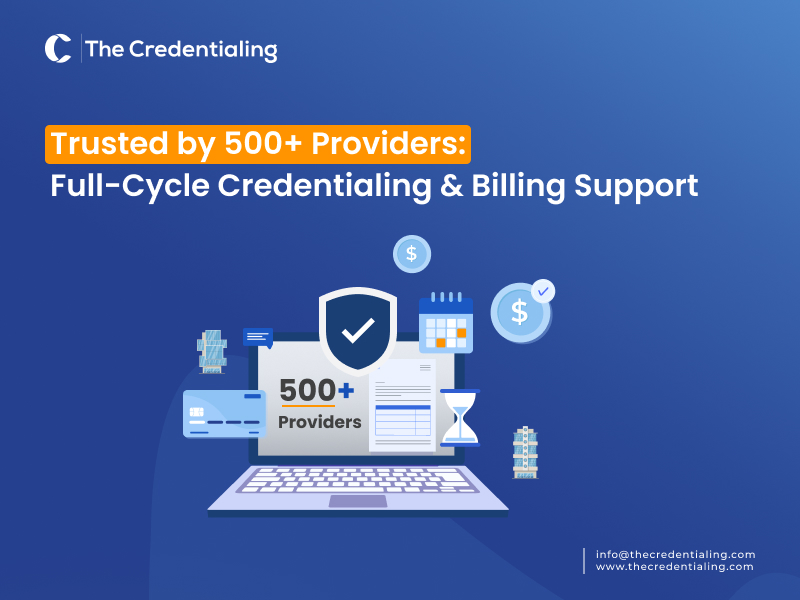Mental Health Billing Services: Credentialing Solved for Therapists
Streamline your therapy practice with expert mental health billing and credentialing services. Get faster approvals, fewer denials, and more revenue today.
Schedule Free Demo Today
Healthcare practices performing mental health care need a distinct type of settlement due to the varying requirements from the regular healthcare services.
Plus, the complexities are added due to the negligence in the credentialing practices, as this process ensures patients the practice's credibility and causes an enhanced trust. Simply put, credentialing enables therapists to expand their insurance network and offer access to care.
On the other hand, non-credentialed therapists cannot address patients with specific treatment requirements and accurately bill the services for insurance reimbursement. Hence, credentialing and billing are the twofold aspects of therapy practice. However, significant reported challenges can hinder practice growth and revenue.
For instance, statistics show that credentialing delays and billing complexities cause many mental health providers to collect only 85% or even less of the amount they are owed. Smaller practices with a scarcity of resources and expertise have a significant influence. Around 25% of the therapists are reported to avoid insurance altogether and choose to work privately with clients, as credentialing is time-consuming in paperwork, reimbursement delays, and unclear payer requirements.
Considering these facts, your specialty practice needs experts backing it with additional resources and an adaptive approach, such as TheCredentialing, that addresses these issues head-on! With our automated support and advanced features, we simplify your mental health credentialing, manage billing efficiently, and help with faster payments despite payer-specific requirements for therapy practice.
Plus, we know what insurance companies are easiest to get credentialed with, as it is counted among the top vendor credentialing companies.
Explore in this guide the essentials of specialty-specific billing and credentialing, and what solutions solve the credentialing and billing hurdles for therapists.
Why Credentialing Matters for Mental Health Providers
Although the credentialing for mental health providers is a time-consuming and affording process that causes many providers to skip the certifications.
However, the advantages counted on these specialty services outweigh the challenges, such as credentialing for mental health care providers, offering access to a wide network of clients for those also that are also unable to pay out-of-pocket costs. Moreover, insurance panel membership is also beneficial even if you change your job location.
The statistics suggest that around 70% of patients prefer healthcare providers within their insurance network as it enhances the practice’s credibility, patient access, and uninterrupted reimbursement.
Yet, the challenges are that therapists' credentialing is time-consuming due to claim filing, and ensuring payment with the lower rate of payments per client. However, the aspirants can explore the features like mental health credentialing helps you expand your clients, especially in your area where more people rely on insurance.
Plus, the process is flexible for your career, which helps you provide a reliable support system no matter the job setting.
Mental Health Billing & Credentialing: What Causes the Distinction?
Although the therapist's credentialing is a part of the broader healthcare credentialing process, there are some distinctions compared to the traditional credentialing and billing as highlighted below:
Multiple licensing types
Therapists' credentialing follows a varying degree of provider licensing in verifications, such as Licensed Professional Counsellors (LPCS) and Licensed Clinical Social Workers (LCSWS).
These license types require a master's degree and 2,000 to 3,000 hours of supervised practice before licensure. Plus, there are the Licensed Marriage and Family Therapists (LMFTS) and Psychologists that have varying state-specific licensure laws. Plus, it is the best credential for therapists. These licensures determine the permissible scope of practice for therapists.
Limited CPT Codes
Mental health professionals mainly integrate with a limited set of CPT codes, which focus on psychotherapy services such as 90791 for Psychiatric diagnostic evaluation, 90832, 90834, and 90837 for Psychotherapy sessions of varying durations.
To give you an example, CPT code 90837 represents a 60-minute individual therapy session and is mostly used in mental health billing services reviews. So, coding and documentation become lengthy and critical and require special attention to documentation to avoid the likelihood of claim denials.
Session-Based Billing
Therapists in healthcare follow a time-based billing due to the treatment type and requirements, and are tied to the session durations, including:
- 90832: 30 minutes
- 90834: 45 minutes
- 90837: 60 minutes
However, therapists have noted that reimbursement rates do not always proportionally increase with session length. For example, a 60-minute session may not yield significantly higher reimbursement than a 45-minute session, highlighting the need for strategic billing practices.
Out-of-Network Claims
Therapists frequently operate as out-of-network providers, which creates billing complexities due to a few factors. For instance, one-third of private practice psychotherapists do not accept insurance.
Plus, patients using out-of-network behavioral health services face balance billing, with half of such families incurring additional charges beyond insurer payments. However, these factors increase the administrative burden for therapy practices while making it a challenging process to deal with.
Payer-Specific Credentialing Rules
Insurers' rules in credentialing vary for therapists from those of physicians, as credentialing varies from one state to another. Hence, the therapists deem it difficult to join the provider panels.
High Claim Rejection Rates Without Proper Documentation
Considering the documentation specificity in mental health services, providers have little to no room for negligence in accurately handling the claims for mental health care. The need is to have special attention to the accurate use of ICD-10 codes, particularly those in the F-code range for mental and behavioral disorders, which is crucial. Moreover, the detailed treatment plans and progress notes are essential to demonstrate medical necessity and secure reimbursement.
Solo or Small Practices
Healthcare records suggest that a significant range of mental health professionals operate independently or in small group settings. However, the majority of mental health practitioners working in solo or small practices lack the required administrative support. On the other hand, larger medical practices have dedicated billing departments. So, therapists in these sections rely more on external billing services.
TheCredentialing is an experienced insurance paneling for therapists, serving specialty care credentialing and billing to all types of clients. We support your credentialing and billing needs with an automated efficiency via our digital credentialing portal.
Apply, access, and track your therapists' credentialing applications with dedicated support. With TheCredentialing mental health credentialing, your practice will access top mental health credentialing specialists.
Plus, our digital system is integrated with many features, such as CAQH, NPI, EFT, and ERA, to keep your data updated and avoid the hurdles of discrepancies in information.
Our digital portal also offers a secure File Transfer Protocol (FTP) feature to maintain your credentialing data in real time with customized security and access.
Mental Health Billing, Different From Traditional Healthcare Billing: The Key Changes & Challenges!
Below are highlighted the specifics, differing mental health billing from the traditional healthcare billing:
Coding differences
Mental health billing codes differ from the procedural Current Procedural Terminology (CPT) to bill insurance companies for services provided
Such mental health billing codes are time-based, depending on the duration of the therapy or counselling sessions. Moreover, these specific codes account for various types of services such as individual or group therapy, family therapy and psychiatry services.
Issues in insurance reimbursement
Mental health service providers have been facing the reimbursement issue for a long time despite the introduction of mental health parity laws to equalise the treatment.
These services receive different rates from the other healthcare services, posing a financial strain. Moreover, non-face-to-face services, such as teletherapy providers, have faced significant hurdles as insurers do not completely cover the services despite these professionals being the standard in medical health care post-pandemic.
Insurance coverage variability
Mental health services vary in terms of insurance coverage, where some of the insurance policies limit the coverage for mental behavioral services.
This leaves the patients prone to extended out-of-pocket expenses while practices disrupt the expected revenue as coverage fluctuates between patients and care providers. Moreover, state-specific regulations also influence the coverage reliability, as some states have stronger mental health parity laws than others.
Such regulations are challenging for mental health care providers to navigate billing as they practice in various locations.
Over-burdening denial management and pre-authorization
Pre-authorization and denial management is an added burden for mental health providers by the insurance companies, as authorization requirements vary from one payer to another.
Hence, denial in these billing processes commonly occurs due to causes including incorrect coding, lack of preauthorization, and inefficiency of documentation.
Moreover, insurance providers deny coverage for the procedures that are “not medically necessary”, such as long-term mental health care or specialized treatments like neuropsychological testing.
Compliance and documentation complexities
In the processes of mental health services, healthcare providers deal with the subjective process, such as in procedures, treatment plans, progress notes, and assessments that need a critical scrutiny to avoid compliance issues. However, the detailed documentation creates the need for audits where the government agencies and insurance providers keep a regular review of medical records to ensure compliance.
TheCredentialing: An End-to-End Credentialing & Billing Solution
TheCredentialing is the best credentialing company for physicians that stay updated with the challenges faced by mental health professionals in billing and credentialing. For instance, 50% of psychiatrists do not accept any form of insurance, compared to 20% of physicians in other specialities. Such disparity in therapists’ credentialing and billing encourages our experts to offer end-to-end billing and credentialing solutions that simplify every step of the process. The purpose? Only to support therapists in minimizing delays, reducing paperwork efforts, and ensuring faster reimbursement through a secure and user-friendly digital portal. These are the highlights of how our services work to stabilize your mental health credentialing and billing efficiency:
- Handle insurance credentialing from start to finish, reducing administrative stress for therapists.
- Accurately complete and submit provider applications to avoid costly delays or rejections.
- Regularly follow up with payers to expedite approvals and resolve bottlenecks quickly.
- Manage CAQH profiles, NPI updates, and insurance re-attestations to keep provider credentials current.
- Set up and manage clean claim submissions to minimize denials and ensure faster payouts.
- Monitor claims status and provide transparent reporting on reimbursements and pending issues
- Offer real-time support for coding, modifiers, and payer-specific billing requirements.
- Provide simple, automated billing workflows that match the pace of growing private practices.
In your search for mental health billing services near me, TheCredentialing is just a call away! Approach our experts today and get a good understanding of our mental health billing training and expertise.
Sit Back and Relax! Let The Pros Handle Credentialing For You!
thecredentialing has built a strong portfolio while providing credentialing services to clients over the years. Our service includes helpful features that you won’t find anywhere else.
Schedule Free Demo Today!

